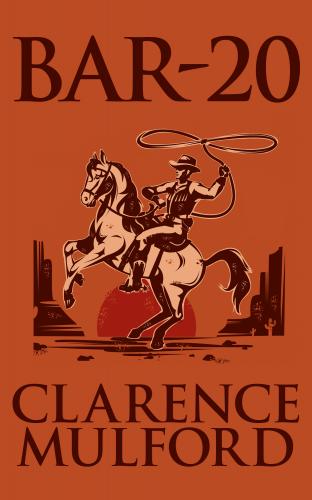BAR-20
By
CLARENCE EDWARD MULFORD
This edition published by Dreamscape Media LLC, 2018
www.dreamscapeab.com * [email protected]
1417 Timberwolf Drive, Holland, OH 43528
877.983.7326
About Clarence E. Mulford:
Clarence Edward Mulford (3 February 1883 – 10 May 1956) was the creator of the character Hopalong Cassidy and who wrote many works of fiction and nonfiction.
Source: Wikipedia
TABLE OF CONTENTS
CHAPTER II. The Rashness of Shorty
CHAPTER V. The Law of the Range
CHAPTER VI. Trials of the Convalescent
CHAPTER VIII. Hopalong Keeps His Word
CHAPTER IX. The Advent of McAllister
CHAPTER X. Peace Hath its Victories
CHAPTER XII. The Hospitality of Travennes
CHAPTER XIII. Travennes’ Discomfiture
CHAPTER XIV. The Tale of a Cigarette
CHAPTER XVI. Rustlers on the Range
CHAPTER XVII. Mr. Trendley Assumes Added Importance
CHAPTER XVIII. The Search Begins
CHAPTER XIX. Hopalong’s Decision
CHAPTER XXIII. Mr. Cassidy Meets a Woman
CHAPTER XXIV. The Strategy of Mr. Peters
CHAPTER XXV. Mr. Ewalt Draws Cards
CHAPTER I.
Buckskin
The town lay sprawled over half a square mile of alkali plain, its main Street depressing in its width, for those who were responsible for its inception had worked with a generosity born of the knowledge that they had at their immediate and unchallenged disposal the broad lands of Texas and New Mexico on which to assemble a grand total of twenty buildings, four of which were of wood. As this material was scarce, and had to be brought from where the waters of the Gulf lapped against the flat coast, the last-mentioned buildings were a matter of local pride, as indicating the progressiveness of their owners.
These creations of hammer and saw were of one story, crude and unpainted; their cheap weather sheathing, warped and shrunken by the pitiless sun, curled back on itself and allowed unrestricted entrance to alkali dust and air. The other shacks were of adobe, and reposed in that magnificent squalor dear to their owners, Indians and Mexicans.
It was an incident of the Cattle Trail, that most unique and stupendous of all modern migrations, and its founders must have been inspired with a malicious desire to perpetrate a crime against geography, or else they reveled in a perverse cussedness, for within a mile on every side lay broad prairies, and two miles to the east flowed the indolent waters of the Rio Pecos itself. The distance separating the town from the river was excusable, for at certain seasons of the year the placid stream swelled mightily and swept down in a broad expanse of turbulent, yellow flood.
Buckskin was a town of one hundred inhabitants, located in the valley of the Rio Pecos fifty miles south of the Texas-New Mexico line. The census claimed two hundred, but it was a well-known fact that it was exaggerated. One instance of this is shown by the name of Tom Flynn. Those who once knew Tom Flynn, alias Johnny Redmond, alias Bill Sweeney, alias Chuck Mullen, by all four names, could find them in the census list. Furthermore, he had been shot and killed in the March of the year preceding the census, and now occupied a grave in the young but flourishing cemetery. Perry’s Bend, twenty miles up the river, was cognizant of this and other facts, and, laughing in open derision at the padded list, claimed to be the better town in all ways, including marksmanship.
One year before this tale opens, Buck Peters, an example for the more recent Billy the Kid, had paid Perry’s Bend a short but busy visit. He had ridden in at the north end of Main Street and out at the south. As he came in he was fired at by a group of ugly cowboys from a ranch known as the C-80. He was hit twice, but he unlimbered his artillery, and before his horse had carried him, half dead, out on the prairie, he had killed one of the group. Several citizens had joined the cowboys and added their bullets against Buck. The deceased had been the best bartender in the country, and the rage of the suffering citizens can well be imagined. They swore vengeance on Buck, his ranch, and
